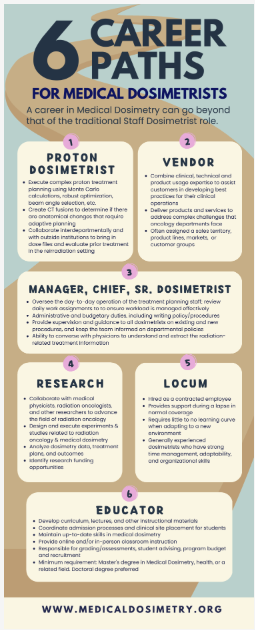Medical Dosimetrists have the option to specialize or pursue various career paths beyond the typical clinical staff role.
Dosimetrists have the option to specialize or pursue various career paths beyond the typical clinical staff role.
Learn about the most common career pathways for a Medical Dosimetrist below.
Staff Medical Dosimetrists design treatment plans and accurately calculate a radiation treatment plan based on the radiation oncologist’s prescription, being cognizant of normal tissues and critical structures in the treatment vicinity. Medical Dosimetrists work closely with physicians, physicists, and other members of the radiation oncology team to implement each treatment plan. The Medical Dosimetrist provides assistance and support to solve diverse physical and technical problems that arise in the clinical environment.
A Proton Medical Dosimetrist plays a pivotal role in treating patients with particle therapy. Collaboration with physicists and radiation oncologists is key to ensure the millimeter accuracy of the treatment is realized for the patient. Adaptive treatment plans and understanding outside treatment records is another aspect of the day-to-day role of the Proton Dosimetrist.
Medical Dosimetrists often accept positions with radiation oncology vendors as an application or sales specialist. Clinical applications specialists are responsible for consulting, training, and supporting oncology professionals in the effective use of radiation oncology products. Responsibilities of clinical applications specialists include phone support, on-site support and assistance in the development of training and application support materials. Sales specialists are involved in the sale of vendor specific radiation oncology products. Sales specialist responsibilities include delivering sales presentations, performing onsite demonstrations of radiation oncology products and developing and maintaining good customer relations.
Medical Dosimetrists may transition into an administrative position within radiation oncology. This may be in the form of a chief medical dosimetrist, chief radiation therapist, or director/manager of the department. Many times, dosimetrists advance to administrative roles in the department or hospital.
Medical Dosimetrists play a vital role in the research aspect of radiation oncology. Their activities include participation in research protocols, publishing articles, assisting in research for computer treatment planning systems, and the development of new patient treatment devices. This pathway serves an important role in the advancement of the radiation oncology profession.
Medical Dosimetrists may decide to work in an independent or contract-type temporary position at various facilities throughout the nation. This pathway often involves a Medical Dosimetrist working under contract with the hospital or facility to fulfill the clinical needs of the Medical Dosimetry department.
Many Medical Dosimetrists have faculty appointments at universities and colleges where they help educate future medical dosimetrists and other radiation oncology professionals. They may also be a director of a medical dosimetry educational program which involves administration, teaching and other duties associated with the program. Some staff Medical Dosimetrists may be a clinical preceptor in addition to their clinical work. The clinical preceptor may be involved in guiding students during clinical education rotations that include training with specific clinical procedures, equipment, treatment planning, and treatment delivery.
The future job market for medical dosimetry is strong. Advancements in treatment planning increase the demand for qualified medical dosimetrists. Wages are comparable with other healthcare professions. Given the diversity and ever-changing technology of the job, lifelong career satisfaction is achievable.
Medical dosimetrists can work in different types of environments and choose different roles in the radiation oncology profession:
Review more information on how medical dosimetrists are involved in these roles.